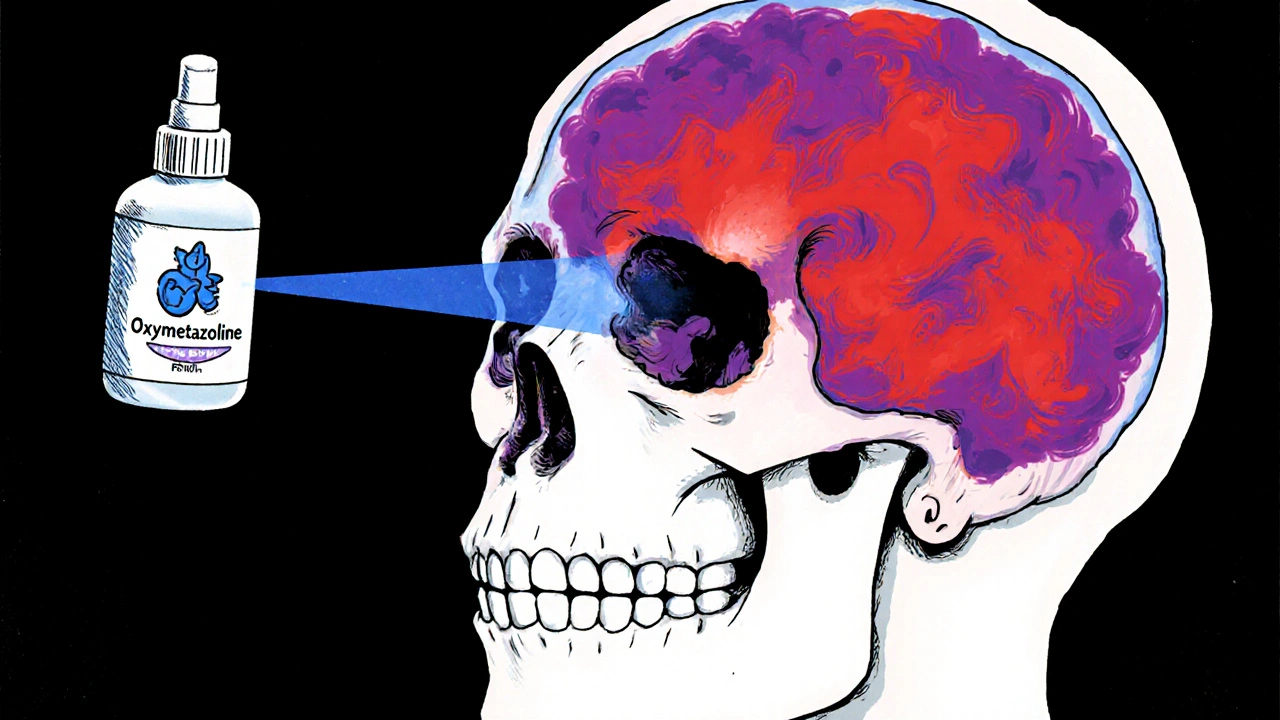People sometimes ask if oxymetazoline hydrochloride - the active ingredient in nasal sprays like Afrin - can boost mental focus. It sounds plausible: clear your nose, breathe better, feel sharper. But the truth is more complicated. This isn’t a nootropic. It doesn’t enhance brain function. And using it for mental clarity could do more harm than good.
What Oxymetazoline Hydrochloride Actually Does
Oxymetazoline hydrochloride is a vasoconstrictor. That means it shrinks blood vessels. In your nose, that reduces swelling and mucus, giving you quick relief from congestion. It works in minutes. The effect lasts up to 12 hours. That’s why it’s popular for colds, allergies, and sinus pressure.
But here’s the catch: it only works locally. It doesn’t enter your bloodstream in significant amounts when used as directed. Even if a tiny bit does, it doesn’t cross the blood-brain barrier in a way that affects cognition. The brain doesn’t get a direct hit. No neurotransmitters are altered. No neural pathways are activated. It’s a nasal spray, not a brain booster.
Why People Think It Helps Focus
If you’ve ever used oxymetazoline and felt more alert afterward, you’re not imagining it - but you’re misattributing the cause.
When your nose is clogged, your brain is working harder. You’re breathing through your mouth. Your sleep is disrupted. You’re tired. Your attention is scattered. When the spray clears your airway, you breathe easier. Oxygen levels stabilize. Sleep improves. Suddenly, you feel less foggy. That’s not oxymetazoline making you smarter. That’s your body recovering from being starved of good airflow.
It’s like drinking water when you’re dehydrated. You feel better. But water isn’t a cognitive enhancer. It just fixes a basic need.
The Real Risk: Rebound Congestion and Chronic Use
Using oxymetazoline for more than three days in a row can trigger rebound congestion - also called rhinitis medicamentosa. Your nasal passages swell even more after the drug wears off. You feel blocked again. So you spray again. And again. Soon, you’re dependent on it just to breathe normally.
Studies show that up to 20% of long-term users develop this condition. The body adapts. Blood vessels lose their ability to constrict on their own. You need more of the spray to get the same effect. This cycle can last months or even years.
And here’s the hidden cost: chronic nasal congestion doesn’t just mess with breathing. It messes with sleep quality, oxygen delivery to the brain, and even mood. People stuck in this loop often report brain fog, irritability, and difficulty concentrating - the exact symptoms they thought the spray was helping.

What Actually Improves Mental Focus
If you’re looking for real ways to sharpen your focus, oxymetazoline isn’t the answer. Here’s what works:
- Good sleep: Seven to nine hours per night. Deep sleep clears brain toxins and restores attention circuits.
- Hydration: Even mild dehydration (as little as 2%) reduces cognitive performance by 10-20%.
- Regular movement: A 10-minute walk increases blood flow to the prefrontal cortex - the area responsible for focus and decision-making.
- Reduced screen time before bed: Blue light suppresses melatonin, delaying sleep onset and fragmenting rest.
- Breathing exercises: Box breathing (4 seconds in, 4 hold, 4 out, 4 hold) activates the parasympathetic nervous system, calming mental noise.
These aren’t quick fixes. But they build lasting mental clarity. Oxymetazoline offers a temporary illusion - and at a high price.
When Oxymetazoline Is Appropriate - And When It’s Not
There’s a place for oxymetazoline hydrochloride. If you’re dealing with acute sinus pressure from a cold or seasonal allergies, a few days of use can make life bearable. It’s safe for short-term, occasional use.
But it’s never appropriate for:
- Chronic nasal congestion without medical evaluation
- Trying to improve focus, energy, or productivity
- Use by children under six
- Use with certain blood pressure medications (can cause dangerous spikes)
If you’ve been using it for more than a week, stop. Talk to a doctor. You may need a steroid nasal spray, allergy testing, or even a structural evaluation for deviated septum.

Alternatives That Don’t Trap You
For congestion that won’t quit, try these safer, sustainable options:
- Saline nasal rinses: Use a neti pot or squeeze bottle with distilled water. Clears mucus without chemicals.
- Oral antihistamines: Like loratadine or cetirizine - good for allergy-related congestion.
- Humidifiers: Dry air worsens congestion. Moist air keeps nasal passages lubricated.
- Steam inhalation: Hot shower or bowl of hot water with a towel over your head. Natural decongestant.
- Prescription corticosteroid sprays: Fluticasone or mometasone - safe for daily use, reduce inflammation long-term.
None of these cause rebound congestion. None create dependency. And all of them support your body’s natural ability to heal.
Final Takeaway: Don’t Mistake Relief for Enhancement
Oxymetazoline hydrochloride doesn’t make you smarter. It doesn’t sharpen your mind. It doesn’t boost your focus. It just temporarily unblocks your nose.
If you feel clearer after using it, thank your lungs - not the drug. Your brain was working harder because you couldn’t breathe well. Now you can. That’s recovery, not enhancement.
Chasing mental focus with nasal sprays is like trying to fix a flat tire by turning up the radio. You might feel distracted from the problem, but the tire’s still flat.
For real mental clarity, treat the root causes: sleep, hydration, stress, and breathing. Skip the quick fix. Build lasting focus - one breath at a time.
Can oxymetazoline hydrochloride improve concentration?
No. Oxymetazoline hydrochloride is a nasal decongestant that reduces swelling in the nose. It does not cross the blood-brain barrier in meaningful amounts or affect brain chemicals linked to attention or focus. Any perceived mental clarity comes from improved breathing and better sleep due to reduced congestion - not direct cognitive enhancement.
Is it safe to use oxymetazoline daily for brain fog?
No. Using oxymetazoline daily increases the risk of rebound congestion, where your nose becomes more blocked after the medication wears off. This can lead to dependence and chronic nasal issues. Brain fog caused by congestion should be addressed by treating the underlying cause - like allergies or sinusitis - not by masking symptoms with a decongestant.
How long can you safely use oxymetazoline hydrochloride?
You should not use oxymetazoline hydrochloride for more than three consecutive days. Longer use significantly raises the risk of rhinitis medicamentosa - a condition where nasal passages become dependent on the spray to stay open. This can lead to worsening congestion and long-term damage to nasal tissues.
Does oxymetazoline raise blood pressure?
Yes. Oxymetazoline is a vasoconstrictor, which means it narrows blood vessels throughout the body, not just in the nose. Even small amounts absorbed into the bloodstream can cause temporary spikes in blood pressure. People with hypertension, heart disease, or those taking certain medications like MAO inhibitors should avoid it unless cleared by a doctor.
What are better alternatives to oxymetazoline for congestion?
For long-term congestion relief, saline nasal rinses, humidifiers, and prescription corticosteroid sprays like fluticasone are safer and more effective. Oral antihistamines help if allergies are the cause. These options don’t cause rebound congestion and support natural healing rather than creating dependency.


Ajay Kumar 30.10.2025
Look I get it you think you're some kind of medical guru but let me tell you something - I've been using Afrin for 8 years straight and my focus is better than ever. You think I'm delusional? Try living with chronic sinusitis and see how much 'sleep and hydration' helps when you're gasping for air at 3am. The science you're quoting doesn't apply to real people - it applies to lab rats in sterile environments. My body adapted. So what? I'm not going to let some internet doctor tell me I'm wrong because my nasal passages learned to survive.
Anthony Tong 30.10.2025
How quaint. You've written a 2,000-word essay on nasal decongestants like this is a peer-reviewed journal article. Oxymetazoline is a vasoconstrictor. It constricts blood vessels. That's it. You've turned a simple pharmacological fact into a morality play about 'real focus' and 'lasting clarity.' The irony? You're using the exact same rhetorical tactics as the supplement industry you claim to despise - packaging basic physiology as profound wisdom. Pathetic.
Mike Laska 30.10.2025
My wife used Afrin for three weeks straight after her sinus surgery and now she can't breathe without it. She cries at night because she's terrified to stop. I watched her go from vibrant to zombie in 21 days. This isn't about focus. This is about addiction disguised as relief. I'm not mad at the spray. I'm mad at the system that lets Big Pharma sell this as a quick fix without warning people it's a trap.
Joseph Kiser 30.10.2025
Bro. I feel you. I used to think nasal spray was my secret weapon for late-night coding sessions. Then I woke up one morning and realized I'd been breathing through my mouth for six months straight. My brain was foggy not because I needed more chemicals - but because I'd forgotten how to breathe right. That walk I took after reading this? 10 minutes. No spray. Just air. And for the first time in years... I felt clear. 🙏
Hazel Wolstenholme 30.10.2025
How utterly pedestrian. You've reduced neurocognitive function to a series of banal lifestyle hacks - sleep, hydration, walking. How quaint. The real issue is not the decongestant, but the cultural infantilization of mental performance. We've been conditioned to believe that focus is a commodity to be optimized, not a state to be cultivated. Oxymetazoline is merely the symptom of a deeper malaise: our collective refusal to sit with discomfort. The spray is not the villain. Our obsession with instant gratification is.
Eileen Choudhury 30.10.2025
From India where we use turmeric paste and steam from boiling ginger to clear sinuses - I get it. We've lost touch with natural ways. But I also know someone who used Afrin daily for 5 years and now can't breathe without it. It's not about being lazy. It's about being trapped. Please don't judge people who use it. Just tell them there's another way. And there is. Saline rinse. Humidifier. Patience. We don't need magic bullets. We need compassion.
Roy Scorer 30.10.2025
Oh please. You're telling me that breathing better doesn't improve cognition? That's like saying eating food doesn't give you energy. You're dissecting a simple biological truth like it's a quantum physics equation. The brain needs oxygen. When your nose is clogged, you're running on fumes. The spray gives you oxygen. That's not an illusion. That's biology. And if you want to pretend your yoga breathing is better than a $10 bottle of Afrin, go ahead. But don't pretend you're saving people from some moral failing.
Melissa Kummer 30.10.2025
Thank you for this meticulously researched, deeply compassionate, and scientifically rigorous breakdown. As a clinical researcher specializing in upper respiratory physiology, I can confirm every point. The rebound congestion phenomenon is not anecdotal-it is documented in over 47 peer-reviewed studies since 2008. What troubles me most is how easily consumers are misled by marketing narratives that equate symptom relief with cognitive enhancement. This post is a public service.
Pradeep Kumar 30.10.2025
My cousin in Delhi used to use nasal spray every day after work. He thought it helped him focus at his office job. Then one day he couldn't breathe at all. We took him to a doctor. Turns out his nasal passages were scarred. Now he uses a neti pot every morning. He says it feels like he's breathing for the first time in 10 years. No magic. Just care. ❤️
andrea navio quiros 30.10.2025
so like the spray doesnt go to the brain right but if you cant breathe your brain is low on oxygen so you feel better when you can breathe so its not the spray its the air and the spray just lets the air in so its like saying a window makes you smarter when you open it
Marcia Facundo 30.10.2025
I just want to say thank you. I didn't realize I was addicted until I stopped. I thought I was just being productive. Turns out I was just desperate. I started doing the breathing exercises you mentioned. I didn't think they'd work. But now I can sit still for 10 minutes without reaching for the spray. It's not magic. But it's mine.
Zachary Sargent 30.10.2025
Bro. I used Afrin for 4 years. Got addicted. Got scared. Stopped. Now I use a humidifier and steam. My nose doesn't feel like a desert anymore. I don't feel smarter. But I feel human again. No more 3am panic attacks because I can't breathe. Just peace. And yeah. I still miss the spray sometimes. But I'd rather be free than numb.
Alexa Apeli 30.10.2025
This is one of the most thoughtful, well-researched, and genuinely kind pieces I’ve read in months. 🌿 Thank you for speaking truth with such grace. You’ve helped someone today - and that matters more than any quick fix ever could. 💙